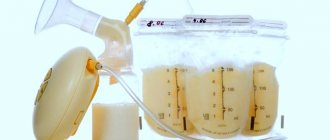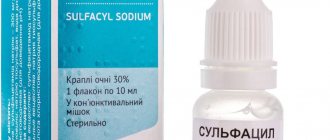Cow's milk is a product loved by many. And it’s quite difficult to imagine the life of modern humanity. Porridge, pies, cakes, sour cream and other fermented milk products are often based on cow's milk. At the same time, there are many who strongly criticize cow’s milk for its excessive fat content, satiety, etc. Whether or not you agree with the potential harm of cow's milk for the human body is everyone's business. However, we can only say with certainty that it is better not to use such a product for children under one year of age. And there are quite a few reasons for this.
Why should you not give cow's milk to infants?
Food allergy to milk in newborns
A large percentage of parents who grew up on milk and remember it as a source of health and energy do not want to understand and accept the fact that it is harmful.
On the Internet you can often find angry comments that infant formula is evil, and cow's milk is a cure for all ailments.
But is it?
First of all, it is necessary to highlight the main “cons” of cow’s milk:
- Large amount of proteins
- Low amount of fatty acids and carbohydrates
- Increased content of mineral salts
- Insufficient iron and vitamins
The fact is that cow's milk contains 3-4 times more potassium and phosphorus than breast milk.
This amount is perfect for a calf's body, but not for a child. Much does not mean good. An excess of these two components can lead to the following consequences:
- Poor absorption of calcium
- Impaired kidney function due to phosphorus overdose
- Rickets
- Dehydration
- Food allergy to milk
- Iron-deficiency anemia
- Diabetes
In children, food allergy to milk in newborns is diagnosed in 2-3% of cases. Its allergen is cow's milk proteins.
It is known that by the third year of life, the reaction to milk in children decreases. But despite this, food allergies in early childhood provoke many other diseases, and also act as a sign of low immunity.
Read: Norms of child development
What are the dangers of drinking cow's milk for children under one year of age?
Naturally, not every child can react to cow's milk. And if some processes take place deep inside, this does not mean at all that you can ignore them. It’s just worth remembering that excessive consumption of cow’s milk by children under one year old can lead to quite serious problems.
For example, doctors know cases of children with type 1 diabetes mellitus. In addition, gastrointestinal bleeding may well develop due to intestinal overstrain during the digestion of such a heavy product.
Doctor Komarovsky's opinion
Doctor Evgeniy Komarovsky, who is popular these days, believes that the issue of cow’s milk is not fundamental and there are no categorical prohibitions on it. It all depends on the tolerance of cow's milk and the age of the child. But in some cases, goat and cow milk can even be dangerous.
Evgeniy Olegovich says that animal milk is not necessary in the diet of infants. Babies can get all the vitamins and substances useful for development in breast milk. Moreover, it is well absorbed and does not cause allergies. The doctor claims that all the beneficial elements of milk are now included in any infant formula.
What else you need to know about milk
Milk contains valuable substances
This product actually contains almost all the vitamins a person needs (albeit in different quantities) and many micro- and macroelements. In addition, children over one year old absorb calcium contained in milk very well. Both milk proteins and fats are perfectly digested by the bodies of babies over one year old.
Children under three years old need special baby milk
Milk for baby food differs from “adult” milk not only in name. It undergoes a strict “casting”; it is selected in certified raw material areas. In addition, such a product is prepared for packaging and filled into containers in separate workshops, where all requirements for the production of baby food are strictly observed. Ultra-pasteurization technology helps destroy pathogenic microflora, but beneficial protein and calcium are preserved. The process of enrichment with vitamins is often carried out.
Milk cannot be stored for a long time
Remember that opened packaging must be kept in the refrigerator and used within 24 hours.
Reviews from parents
To the question “When can a child be given cow’s milk?” Representatives of past generations answer that milk should be introduced into a baby’s diet as early as possible.
Is it possible to include milk of animal origin in a child’s diet?
Of course, modern young mothers do not remember or do not know that several decades ago, representatives of the fairer sex returned from maternity leave after 3 months. Due to the circumstances of those times, women did not have the opportunity to provide regular breastfeeding to their children. Milk of animal origin came to the rescue: cow or goat.
But what do modern parents say? Reviews are contradictory: some are for, others are strongly against.
The first group of parents who feed their children or were themselves fed cow's milk remember that more than one generation grew up on this product. According to them, the natural product cannot cause harm. On women's forums there are a sufficient number of stories about the ideal health of children whose diet contains milk of animal origin.
This group of parents ignores the enormous environmental changes, the high mortality of newborn children during the widespread consumption of cow's milk by infants, and the presence of diseases in older generations due to the consumption of cow's milk.
Read: Weight of newborn children: norms, deviations and influencing factors
The second group of parents is against it, because after trying to include milk of animal origin in the baby’s diet, they are forced to treat food allergies to cow protein, iron deficiency anemia, and other diseases listed above.
Fat or low fat?
Today, the food industry offers many options for skim milk. It is considered preferable for adults and children who cannot tolerate full-fat cow's milk. However, in the very concept of “low-fat”, according to Evgeniy Komarovsky, there is a catch.
The fact is that vitamins A and D, which are contained in milk, can only dissolve in fats. If milk is skimmed, it will no longer contain these vitamins. Therefore, you should not believe marketers who promise low-fat baby milk with vitamin D in advertising.
Baby milk differs from regular milk by ultra-pasteurization. The percentage of fat content in it is reduced, but is not at the minimum level. The box usually indicates at what age manufacturers recommend the product. Most often it is 8 months. Komarovsky calls for giving such milk if the mother really wants to do it, no more than once a day and in small quantities.
Children after one year can dilute regular milk with a fat content of 3% with plain water by about one-third of the volume.
How to breed cow's milk
A child’s kidneys mature closer to the age of one, and around this time you can start giving the child milk, gradually introducing it into the diet.
But what if parents still decide to include cow's milk in the diet of a baby who is under one year old? In this case, you should adhere to strict rules:
- The baby's condition and reactions to milk should be monitored
- It is strictly forbidden to give cow's milk to children under 8 months.
It is necessary to start drinking cow's milk with the lowest possible dose. The minimum dose is considered to be ½ teaspoon in a 1:2 dilution. It is believed that in order to dilute the fat content of milk, you need to boil it, but in this case it should be taken into account that it will lose its energy value.
Cow's milk should only be given to children under one year of age in the form of homemade infant formula.
First of all, you need to boil 70 ml of water. Then add 130 ml of boiled cow's milk. Add one teaspoon or 5 g of sugar to 200 ml of the resulting mixture.
The milk in the above recipe can be used as long as it is made from canned whole milk powder. The milk itself must be prepared according to the instructions on the label and only then converted into a homemade milk formula.
In the modern world, with progress in the field of medicine, cow's milk has lost its popularity due to the dangers it poses. Nowadays, the optimal feeding option is still breast milk and adapted milk formulas.
Video about the benefits of cow's milk for children:
Read: How to quickly cure a runny nose at home
11 Nov 2021 Valeria 387
Share this post
We recommend reading along with this article
- Choosing a complex of vitamins by age for children
- Similak Premium: composition, feeding schedule, reviews
- How to make a children's room with a unique and inimitable design
- When and how to properly introduce the first complementary foods to a baby
- Menu for a 7 month old baby: recommendations for the correct…
- Is it worth having a second child: arguments for and against
- How healthy is goat milk for babies?
- What vitamins are needed for children who are still breastfeeding?
- What you need to know about the benefits of goat milk for children
Discussion: 2 comments
- Anna:
11/21/2017 at 00:28Of course, you need to listen to professionals, but if there is a need to give your child cow's milk, then you can try, starting with small doses. It says here that up to 8 months. You can’t give it at all, but when my son was 5 months old. I cooked him porridge with cow's milk and fed it to him. I had stomach problems several times, but there were no allergies or other problems. He tolerated it well.
Answer
Irina:
01/20/2020 at 11:26
Since I had stomach problems, does this mean that I “tolerated it well”? But we had allergies for up to 1.5-2 years, it was worth trying milk, in porridge or so, as the child’s entire butt was sprinkled. Friends gave their son milk from almost 3 months old, and everyone also said that there were no health problems, but in reality it turned out to be quite the opposite. So I am against cow's milk until at least a year old.
Answer
Formula or milk?
If after 12 months a decision is made to introduce whole milk into complementary foods, Evgeniy Komarovsky advises making an informed decision. This product in measured quantities will no longer cause harm, but an adapted infant formula, in which the amount of phosphorus is reduced and the amount of calcium and vitamin D is increased, will still be more beneficial.
The amount of iron in cow's milk is insufficient and regular consumption will lead to anemia. In adapted formulas, this composition parameter is provided, and the child will receive the amount of iron he needs.
If the family budget allows, it is better to choose a formula appropriate for age - from 12 months. Typically such mixtures are designated.
Should you boil milk?
Pasteurized milk, which is sold in any store, does not require additional boiling, says Evgeny Komarovsky. But if the product was purchased at the market, from grandmothers who keep cows or goats on their farm, then it is necessary to boil it.
If you buy a product from a neighbor whom you know well, and you know her cow almost personally, then you don’t need to boil milk that was milked no more than 2 hours ago. It contains a large number of beneficial bacteria, the content of which noticeably decreases within a couple of hours after milking.
Boiling destroys some vitamins and microbes that may be in milk. But proteins, fats and carbohydrates are retained in full, so parents do not have to worry about the energy composition of the drink.
Dairy products
Fermented milk products are healthy and can be introduced into complementary foods for children from about 6 months. The main thing, says Evgeny Komarovsky, is not to give kefir and cottage cheese in the heat, since together with them you can feed a child in hot weather and a fair amount of E. coli. It is also important to know when to stop - do not feed your little one six times a day with kefir alone, because there will be no benefit from such complementary feeding.
Children should be given fermented milk products no more than once a day; it is advisable that they are produced not in factories that produce fashionable and advertised yogurts, but in special baby food factories. The shelf life of good baby kefir is no more than a day. It should not contain any sweeteners, colors or “strawberry and banana flavors.”
It is very good if a mother learns how to make homemade fermented milk products for her child. For them, you can use regular store-bought cow's milk with a fat content of no more than 1.5%.
Complementary feeding in the form of fermented milk products is not very desirable for children with mineral metabolism disorders and signs of rickets. Therefore, before introducing such complementary foods, it is advisable to consult a pediatrician.











